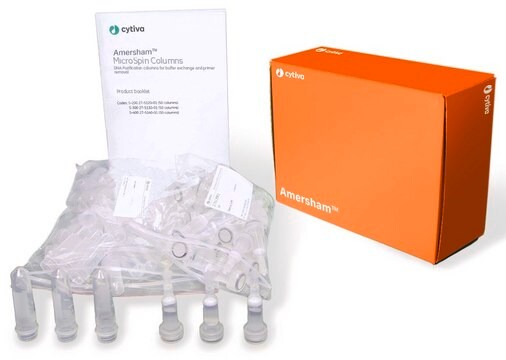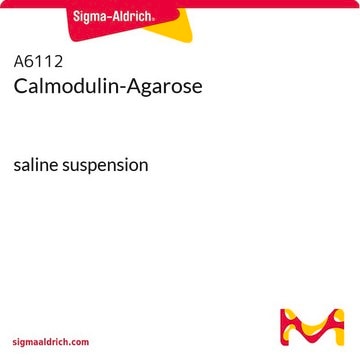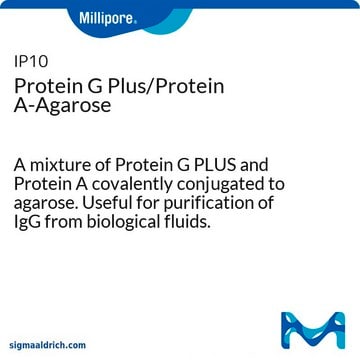U5632
Ubiquitin−Agarose
saline suspension
Anmeldenzur Ansicht organisationsspezifischer und vertraglich vereinbarter Preise
Alle Fotos(1)
About This Item
Empfohlene Produkte
Form
saline suspension
Qualitätsniveau
Kennzeichnungsgrad
7-15 mg per mL
Methode(n)
affinity chromatography: suitable
Matrix
Fast flow highly cross-linked 4% beaded agarose
Matrix-Spacer
6 carbon
Lagertemp.
2-8°C
Anwendung
Ubiquitin-agarose is used in affinity chromatography, protein chromatography, intracellular protein degradation, calpain and lysosomal proteases, proteomics, specialty resins and ubiquitination analysis. Ubiquitin-agarose has been used in a study to produce evidence for a particulate location of ubiquitin conjugates and ubiquitin-conjugating enzymes in the rabbit brain. Ubiquitin-agarose has also been used to study fertilization of the ascidian, Halocynthia roretzi.
Physikalische Form
Suspension in 1 M NaCl, enthält 0.02% Thiomersal
Lagerklassenschlüssel
10 - Combustible liquids
WGK
WGK 3
Flammpunkt (°F)
Not applicable
Flammpunkt (°C)
Not applicable
Persönliche Schutzausrüstung
Eyeshields, Gloves
Analysenzertifikate (COA)
Suchen Sie nach Analysenzertifikate (COA), indem Sie die Lot-/Chargennummer des Produkts eingeben. Lot- und Chargennummern sind auf dem Produktetikett hinter den Wörtern ‘Lot’ oder ‘Batch’ (Lot oder Charge) zu finden.
Besitzen Sie dieses Produkt bereits?
In der Dokumentenbibliothek finden Sie die Dokumentation zu den Produkten, die Sie kürzlich erworben haben.
M Majetschak et al.
European journal of biochemistry, 255(2), 482-491 (1998-08-26)
Ubiquitin is often implicated as a specific tag for protein degradation via the ubiquitin system although only a limited number of physiological proteins have been shown to be degraded in their native tissues via this pathway in vivo. Ubiquitin may
A Ciechanover et al.
The Journal of biological chemistry, 257(5), 2537-2542 (1982-03-10)
We have previously described an enzyme that activates ubiquitin, the heat-stable polypeptide of the ATP-dependent proteolytic system from reticulocytes (Ciechanover, A., Heller, H., Katz-Etzion, R., and Hershko, A. (1981) Proc. Natl. Acad. Sci. U. S. A. 78, 761-765). It carries
Anjali Joshi et al.
Traffic (Copenhagen, Denmark), 9(11), 1972-1983 (2008-09-27)
Retroviral Gag polyprotein precursors are both necessary and sufficient for the assembly and release of virus-like particles (VLPs) from infected cells. It is well established that small Gag-encoded motifs, known as late domains, promote particle release by interacting with components
Hyoung Tae Kim et al.
Methods in molecular biology (Clifton, N.J.), 832, 639-652 (2012-02-22)
The biological role and fates of ubiquitin (Ub) conjugates are determined by the nature of the ubiquitin chain formed on the protein. Recently, we reported that Ring-finger and U-box ubiquitin ligases (E3s), when functioning with different E2s, synthesize different types
Shin-Chung Kang et al.
The Journal of pathology, 203(1), 603-608 (2004-04-20)
Although the key event in the pathology of prion diseases is thought to be the conversion of cellular prion protein (PrP(C)) to the protease-resistant scrapie species termed PrP(Sc), the factors that contribute to neurodegeneration in scrapie-infected animals are poorly understood.
Unser Team von Wissenschaftlern verfügt über Erfahrung in allen Forschungsbereichen einschließlich Life Science, Materialwissenschaften, chemischer Synthese, Chromatographie, Analytik und vielen mehr..
Setzen Sie sich mit dem technischen Dienst in Verbindung.








